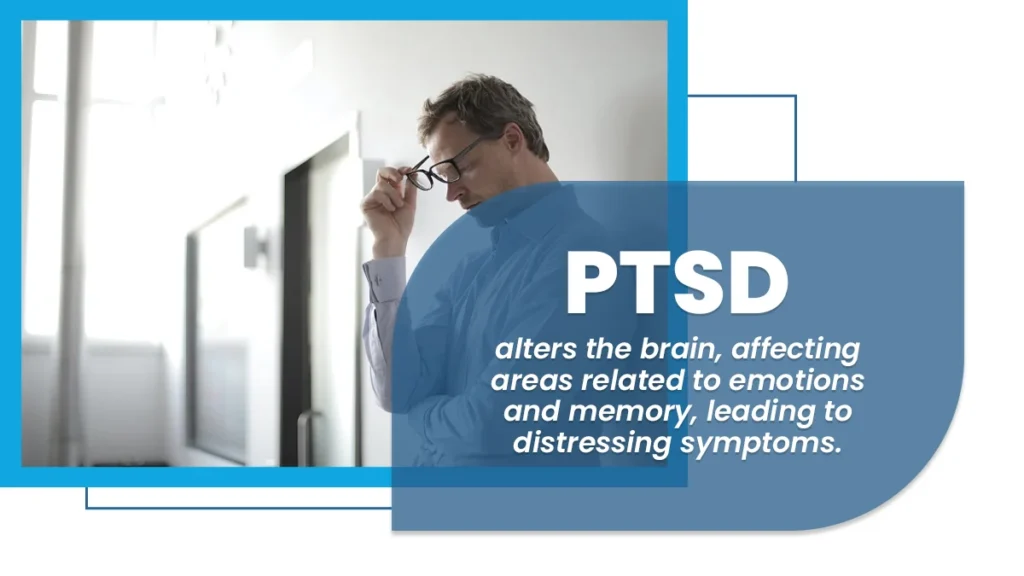Post-traumatic stress disorder (PTSD) is a mental health condition that is triggered by a traumatic life event. It could be a car accident, combat, or any frightening experience. People with PTSD may have flashbacks, nightmares, and anxiety symptoms, even when they’re safe.
They might avoid reminders of the event and feel on edge. PTSD can affect daily life, but therapy and support can help manage symptoms and improve well-being.
Key Takeaways
PTSD comes from trauma affecting thoughts and emotions and with varying symptoms like stress and nightmares. Here’s what you need to know:
- PTSD alters the brain, affecting areas related to emotions and memory, leading to distressing symptoms.
- Women, veterans, and first responders may be more susceptible to PTSD.
- Therapy and medication can significantly improve life for individuals managing PTSD.
The Haven Detox-New England stands with you during dark times. Find healing by calling us at (844) 933-4145.

Science Behind Post-Traumatic Stress Disorder (PTSD)
Post-traumatic stress disorder (PTSD) involves changes in the brain and nervous system. When a person experiences trauma, the brain’s fear response gets triggered. This can lead to brain changes in areas like the amygdala, responsible for emotions, and the hippocampus, crucial for memory. The persistent influx of stress hormones, like cortisol, may disrupt brain balance, affecting mood and memory functions.
The prefrontal cortex, which helps regulate emotions, can also be impacted, leading to difficulties in emotional processing. These biological changes contribute to symptoms like reliving memories, nightmares, and heightened stress levels. Understanding the science behind PTSD informs therapeutic approaches, focusing on rewiring neural pathways and restoring emotional regulation.
PTSD By The Numbers
PTSD can impact the lives of individuals from all walks of life, but certain demographic factors contribute to varying prevalence rates. U.S. Department of Veteran Affairs states that approximately 6 out of every 100 people in the United States may experience post-traumatic stress disorder (PTSD) at some point in their lives. Many individuals recover with treatment and no longer meet the criteria for PTSD.
In any given year, about 5 out of every 100 American adults have PTSD, amounting to approximately 13 million Americans in 2020. Women are more prone to PTSD than men, with about 8 percent of women and 4 percent of men developing PTSD during their lifetime. Veterans, especially those who served in war zones, are more likely to have PTSD compared to civilians due to the nature of their experiences, including combat exposure and deployment-related stressors. Such statistics reveal the need for awareness and affordable treatment to overcome this issue in the country.
Signs And Symptoms Of PTSD
Post-traumatic stress disorder (PTSD) manifests through a range of symptoms that can profoundly impact individuals who have experienced trauma. Physical symptoms may include:
- Heightened startle responses
- Difficulty sleeping
- Chronic fatigue
- Shivering
Other than the physical effects of PTSD, individuals with PTSD may experience intense feelings of fear, guilt, or sadness alongside emotional numbness or detachment.
People with PTSD may engage in the following:
- Avoidance behaviors, such as steering clear of reminders of the trauma.
- Self-destructive tendencies, including substance abuse and self-harm.
PTSD symptoms can disrupt daily functioning, leading to depression, strained relationships, and decreased quality of life. For younger children, symptoms may manifest differently, such as through regression or reenacting traumatic events during play. Understanding and recognizing these symptoms are crucial steps toward seeking appropriate support and treatment to alleviate the distress associated with PTSD.
Factors Leading to Post-Traumatic Stress Disorder (PTSD)
Post-traumatic stress disorder (PTSD) is a complex condition that can arise from a variety of traumatic events. These events, ranging from severe injury to physical abuse and unexpected death, can profoundly impact individuals of all ages.
Traumatic Events
Experiencing certain traumatic events can significantly contribute to the development of post-traumatic stress disorder (PTSD). These events may include severe injuries, physical abuse, unexpected deaths, or situations causing great distress.
For children and teens, child abuse or exposure to traumatic situations may lead to the disorder. Additionally, the type of event and how it is processed emotionally can impact the likelihood of developing PTSD.
Biological and Psychological Factors
Biological factors, including genetic predispositions and the brain’s response to stress, play a role in the development of PTSD. Individuals may exhibit a different way of processing and coping with traumatic memories, influenced by their genetic makeup and neurological responses.
Psychological factors, such as pre-existing mental illnesses or the experience of complex PTSD, can contribute to the development and persistence of PTSD symptoms. The emotional impact of trauma, especially in childhood or adolescence, may shape how the brain processes and copes with upsetting memories, influencing the risk of developing PTSD.
Environmental and Social Factors
Environmental and social factors, encompassing personal circumstances and the surrounding support system, also influence PTSD. Unexpected deaths or exposure to traumatic situations such as bullying can heighten the risk. Additionally, the quality of support and the ability to cope with traumatic events may vary among individuals, impacting the likelihood of developing PTSD.
Disruption and Impact on Daily Life
Post-traumatic stress disorder (PTSD) can significantly disrupt daily life for people of all ages who have experienced trauma, whether from a natural disaster, severe injury, or other traumatic events. Symptoms like anxiety, nightmares, and flashbacks can interfere with work, school, and relationships. Children, both older and younger, may struggle academically and socially due to PTSD’s effects.
Moreover, individuals with PTSD may develop other mental disorders like acute stress disorder or anxiety disorders, amplifying their distress. In severe cases, PTSD can lead to suicidal thoughts or attempts. Coping with PTSD requires ongoing support, therapy, and understanding from loved ones and communities, highlighting the importance of recognizing and addressing the impact of trauma on daily life.
Tools and Techniques to Overcome PTSD
Post-traumatic stress disorder (PTSD) can be a debilitating condition, but there are various tools and techniques available to help individuals manage and overcome its challenges.
Diagnostic Criteria
Understanding the diagnostic criteria for PTSD is crucial for identifying and addressing the condition effectively. Diagnosis typically involves a physical exam and assessment. Diagnostic criteria include evaluating the individual who has been exposed to a traumatic experience and exhibits symptoms such as avoidance behavior, negative mood changes, and hyperarousal.
For PTSD diagnosis, these symptoms must persist for at least a month and cause significant distress or impairment in daily life. Seeking evaluation from a mental health professional ensures accurate diagnosis and appropriate treatment options.
Therapy Programs and Medications
Therapy programs are an effective treatment that plays a vital role in treating PTSD. Talk therapy, such as cognitive behavioral therapy (CBT), is widely used and effective in helping people process traumatic experiences, address negative thought patterns, and develop coping strategies.
Eye movement desensitization and reprocessing (EMDR) is another evidence-based therapy that helps individuals process distressing memories. Doctors may also prescribe anti-depressant pills such as selective serotonin reuptake inhibitors (SSRIs) to alleviate symptoms. While medications aren’t the sole solution, they can be a valuable addition to the main treatments, especially when addressing coexisting mental health problems.
Support Groups
Onsite and online support groups provide a valuable source of encouragement, understanding, and solidarity for individuals living with PTSD. During group sessions, people connect with others who have shared similar experiences.
That can reduce feelings of loneliness and provide a sense of belonging. Mental health professionals, including psychiatrists or peers, may organize support groups and offer a safe space to share experiences, learn coping skills, and receive emotional support.
Living With PTSD
Living with post-traumatic stress disorder (PTSD) presents challenges. However, there are self-care strategies and avenues for seeking support that can contribute to a more fulfilling and manageable life.
Self-Care Strategies
Creating a daily self-care ritual can provide a sense of stability and predictability, helping to manage the unpredictable nature of PTSD symptoms. Mindfulness practices such as deep breathing or meditation can promote relaxation and reduce anxiety levels.
Moreover, engaging in regular physical activity, such as jogging, has been shown to have positive effects on mood. Exercise can also serve as a healthy way to cope with anxiety and stress. Creative outlets, like art, music, or writing, offer a way to express and process emotions, providing a therapeutic release. Maintaining a balanced diet, adequate sleep, and avoiding substance abuse can positively impact overall well-being.
Seeking Support from Family and Friends
Sharing your experiences and feelings about distressing events with trusted friends and family members fosters understanding and can strengthen emotional connections. Providing information about PTSD to those close to you helps them comprehend the condition and respond more supportively.
Communicating personal boundaries and needs helps create a supportive environment, minimizing potential triggers. Both for yourself and those around you, recognizing that healing from PTSD is a gradual process promotes patience and understanding. Encouraging family or friends to attend therapy sessions can enhance their understanding of PTSD and contribute to a collaborative support system.
Frequently Asked Questions (FAQ)
What does PTSD do to a person?
PTSD can change how a person feels and behaves. They may become a different person, feeling scared or upset often. Young children with PTSD might act differently, like being more clingy or having nightmares.
It happens after life-threatening events like accidents or violence. Symptoms include flashbacks, avoiding reminders, and feeling on edge. Getting support from loved ones and professionals can help manage PTSD and improve well-being.
What is PTSD, and what causes it?
Post-traumatic stress disorder (PTSD) is a serious mental health condition resulting from exposure to trauma, such as sexual assault, violence, or life-threatening events. Personal factors, like previous trauma or family history, can contribute.
It manifests through symptoms like flashbacks and avoidance. Misuse of substances like alcohol may develop as a coping reaction. Special events, like military service, can also trigger PTSD.
Does PTSD ever go away?
PTSD can improve with treatment, and some people recover fully. It might not go away completely for everyone, but therapy, support, and coping strategies with the assistance of a doctor can help manage symptoms.
Time can also play a role, as symptoms may lessen over the years. Seeking professional help and building a strong support system increases the chances of living a fulfilling life despite the challenges posed by PTSD.
The Haven Detox-New England For Mental Health
Post-traumatic stress disorder can disturb the normal functioning of life and requires professional mental health treatment for recovery.
In a secure facility, we offer residential treatment under 24/7 care with therapy and counseling sessions. Our team of doctors craft a personalized plan to address the causes of PTSD and help you learn healthy coping skills.
Don’t hesitate to reach out to us today and learn about our services. Call us now at (844) 933-4145.
Verify Insurance
Let’s get you or a loved one help with a few simple steps.




